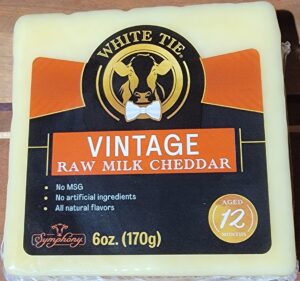 All Natural Raw Cheddars
All Natural Raw Cheddars

Classic Raw Cheddar
Six month aged Raw Cheddar has the taste of a much more aged product. Perfect for melting. It is made from unpasteurized milk. After six months of aging all the bad bacteria, that we usually pasteurize out is gone and all the good bacteria we usually pasteurize out is still in the cheese.

Smoked Raw Cheddar
Six month aged Apple wood smoked Raw Cheddar has the taste of a much more aged product. Perfect for melting. It is made from unpasteurized milk. After six months of aging all the bad bacteria, that we usually pasteurize out is gone and all the good bacteria we usually pasteurize out is still in the cheese.

Garlic & Dill Raw Cheddar
This Garlic & Dill is six month aged Raw Cheddar has the taste of a much more aged product. Perfect for melting with great taste. It is made from unpasteurized milk. After six months of aging all the bad bacteria, that we usually pasteurize out is gone and all the good bacteria we usually pasteurize out is still in the cheese.

Vintage Raw Cheddar
Vintage Raw Cheddar is over one year old. It has your typical salt crystals with a seriously bold flavor. Use as any aged cheddar. It is made from unpasteurized milk. After six months of aging all the bad bacteria, that we usually pasteurize out is gone and all the good bacteria we usually pasteurize out is still in the cheese.

This Garlic & Dill is six month aged Raw Cheddar has the taste of a much more aged product. Perfect for melting with great taste. It is made from unpasteurized milk. After six months of aging all the bad bacteria, that we usually pasteurize out is gone and all the good bacteria we usually pasteurize out is still in the cheese.

